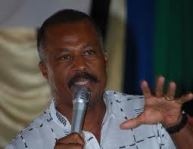Introduction:
After a few days in Barbados, mostly resting, but spending time with friends and acquaintances alike, I have returned with a feeling of deep sadness for a nation for which I have a very deep affection. But, we have a situation in which the national political discourse has been reduced to a leading minister inviting the leader of the official Opposition to strip naked and run down Broad Street, our main thoroughfare, to grab attention. While, at the same time, the governor of the central bank could announce that the economy is in recession and the minister of finance, the captain of the nation’s economy, did not see fit to respond to, the Opposition did not speak out on, our academic economists kept their opinions to themselves nor did our feeble media see it fit to inform their readers.
As I have said before, the nation is in serious crisis, only this time it is much worse than it previously was. Yet, there is an epidemic of denial: a police force that is imploding and cannot properly guard against organised criminality, medieval religious practices and family abuse. We are a nation that has lost faith in itself, when we could appoint a Canadian – repeat the word, Canadian – as head of our football association and every spare bit of land bought by dubious foreigners because our policymakers are addicted to foreign reserves. The New Barbados has also lost its moral purpose, its sense of decency, as is reflected in the obscenities that desecrate the airwaves as a matter of course; of the total national silence when a toddler can make sexual gestures over an apparently drunken woman at Crop Over, our leading cultural event; when our leading news paper thinks that pornographic pictures of juveniles having sex in a class room is newsworthy. Even more, not a single senior executive or director of the publishing firm has made a public statement about the obscenity. If ever there was a case for ordinary Barbadians to show their power as consumers and ban that publication, it is now. This is a long way from the nation I know as a young man, when, in the 1960s it was exporting people to work on London buses, trains and in the national health service, routinely gave them a printed booklet on how to behave in Britain. Those were days when the nation was concerned about its global reputation as reflected in the behaviour of its citizens.
Others have sensed our weakness when the Canadian owners of Barbados Light & Power, who by rights should not be running our light and power company, is threatening to blackmail us with a gangster threat that unless they get an extended deal to 2040, they will not invest any more in the existing plant. What is worse, government has not told them where to go with their threats and future investments. One explanation for our policy-making weakness is that there is a futile attempt to close down the public intellectual argument with nonsense about undermining the government and de-stabilising the nation. A government that in place of sound policies is resorting to fear and threats of military action to silence opposition. Such folly says more about the advocates of such negativity than it says about the level of the public discourse. On the one hand we talk, boast even, of the level of our public education, then on the other try to avoid or censor debates. A robust public discussion is good for the development of the nation, it strengthens our democracy, improves the nature of public understanding and, as a result, leads to better policy-making.
Managing the Economy:
However, it is to the incompetent management of our economy that we must turn, since our immediate prosperity depends on this. And the paucity of ideas by our political master and technocrats is now official, well sort of: the ministry of finance is inviting people to submit papers on economics and finance; in other words, the ministry is fishing for ideas they can plagiarise, six years after coming to office. This, I offer, is a humiliating climb down for the minister, his apologists, other advisers, the central bank executive team, and all those who offer advice to the government. Some of the minister’s cheerleaders and advisers, such as Professor Frank Alleyne, to my mind need a crash course in economic policymaking. It is tempting to ignore, what to my mind, is the economic semi-literacy of the great Professor, who in a misguided recent statement (if reported correctly) said the economy was well managed. Such ignorance is appalling. Had an A level student written this nonsense I would have failed him.
To fully understand the depth of the mess we are in as a nation, here is a brief glimpse of the global situation. Having a reality check is one of those phrases meant to put down an intellectual rival, but in the case of our minister of finance, the governor of the central bank and our economic policy-makers, there is an urgent need to face this reality. Until the global banking crisis of 2007/8, the global economy had experienced nearly three decades of growth, the highest in global history. Even with the set back of the global crisis, an event that started on the books of the private sector (the collapse of Lehman Brothers, the sub-prime meltdown and the fog of SPVs and SIVs) and later transferred to the public sector in a series of bail-outs, the global economy has returned to higher than expected growth.
By the end of 2011, the total value of the global financial sector – equity market capitalisation, sovereign and corporate bonds, loans, etc – had risen from US$175 trillion at the end of 2008, to $212 trillion at the end of 2010, higher even than it was at the end of 2007, before the global collapse. According to one report: “Still, the recovery of financial markets remains uneven across geographies and asset classes. Emerging markets account for a disproportionate share of growth in capital-raising as mature economies struggle. “Debt markets remain fragile in many parts of the world, and the growth of government debt and of Chinese lending accounts for the majority of the increase in credit globally.” In 2010 alone, global debt and equity grew by US$11 trillion, with debt accounting for $5 trillion and government bonds by a further $4 trillion. New lending in emerging markets by the Chinese accounted for US$1.2 trillion in 2010, while other emerging markets added $800bn. That year, cross-border capital flows reached US$4.4 trillion, 60 per cent below their peak, according to the study.
In simple terms, as a nation, even if a small one, we are missing out in a bad way, made worse by our leaders going cap in had around the world begging for hand-outs. But now is decision time. The government has got a choice of taxing income, or taxing wealth or toughing it out as we decline as a nation. As things stand, it appears as if it prefers that ordinary taxpayers should subsidise the wealthy, including the expatriates who have colonised our West Coast and those who make massive amounts of money from them. If you have any doubts about this, just look at the incentives it gives to businesses like Cost-u-Less, Sandals, and others, or have a quick read of the Tourism Development Act to see what hoteliers can bring in to the country duty free on a promise of creating jobs. Does anyone every follow up these promises?
The redistribution of the nation’s wealth should be the preferred option, social policy number one, for this or any other government, so that we do not have the extremes of dirt poor people, living in hovels, on the one hand, and those on multi-million pound mansions on Royal Westmoreland, on the other. That was the implicit promise of constitutional independence. Further, the economic debate should be about the debt-to-GDP ratio and the continuing spiralling IOUs the government is piling up, not the bogus one of foreign reserves, which is an intellectual con trick. However, for reasons not made public, combined with media ignorance, the focus remains on the foreign reserves mantra.
Improving Services:
But we are not just economic people. How we interact as humans, as citizens of a small island, is central to how we grow. The first principle of having a service economy is the recognition of what ‘service’ means. Sometimes it is embarrassing going in to banks, shops and government departments seeking a service and having to tolerate the most lackadaisical, obstreperous, obstinate of workers, who in better times we are told by NISE, are the best workers in the world.
Vision:
We also need a clear vision of the kind of society we want to create. Any government of national unity must have a clear vision of what the key issues are and what it wants to achieve. First on the agenda in these times must be sorting out the economy in the short term; but putting our young people, our most valuable resource, back in education, employment or training must equally be high on the to do list.
Also high on the agenda must be the role played by the public sector, both in terms of making a contribution to productivity, and therefore growth, and as a key part of the engine of future prosperity. There is no real practical reason why, for example, it should take more than five working days to register a new company in Barbados and make the necessary utility connections to a new office, apart from a collective administrative inertia.
Analysis and Conclusion:
The time has come when concerned citizens, and those who have the privilege of living in our country, should step forward and put in place a dynamic plan for growth. We can no longer wait on an incompetent government and public sector workers who clearly do not have any new ideas. A national culture of profligacy, of denial, of selfishness and greed; a national culture that has lost its moral compass, allowing the leading newspaper to publish, at various times, a toddler making sexual gesture on a mature woman and one alleging sex in a classroom – these are just the symptoms of a decaying society. The danger is that in the absence of any real alternative to collective political incompetence is that there will be a rise of popular nationalism, looking for simplistic answers and rallying round a charismatic leader which will be bad for the nation and could fully reverse everything that Barbados has ever stood for.
The dangerous flirtation with Beijing, the capital of a nation that does not hesitate to sack university professors and journalists for expressing incorrect views, may well end in tears. Barbados is but one of many Caribbean islands, most of them members of Caricom, forming a queue in Beijing to worship our new Chinese masters. We are now all Confucian, or confused. In Jamaica, the country that along with Guyana that should be piloting Caribbean economic growth, senior policymakers have now borrowed to finance a new toll road, giving the Chinese a fifty-year period of grace in which to collect tax-free tolls, and in exchange have given the Chinese 3000 acres at Goat Island. The Chinese, through a company called Chinese Harbour, have taken over most of the Jamaican sugar plantations on an 80-year lease, on condition that they put at least some of the factories back in service, but they have al ready refused to refurbish the factories, breaking the original agreement. Yet, the Jamaican government, like most other Caribbean governments, has refused to enforce the agreement. The Jamaican government is also contemplating withdrawing visa requirements (Jamaicans will still be required to have visas to visit China) and arrangements have been made for 100000 Chinese to visit Jamaica every year; whether these will be visitors or residents is not clear, nor is it clear if the workers building the roll road will be allowed to settle in Jamaica.
That is not the only national humiliation; there is a Chinese owned shop, similar in terms of business model to Costco, in which customers are served through a hatch by two local women. Shoppers are not allowed to browse with their trolleys as in any other supermarket; worse, I am told, when the manager wants to go to the toilets, he locks the two women in like monkeys in a cage so that they cannot serve the waiting customers.
Those who think the Chinese are a soft touch should take a closer look at what they are doing in Africa, the Caribbean and Latin America. This is a modern form of Trojan Horse entryism and will lead, in time, to serious social conflict. All this in the modern Caribbean which, in the English-speaking islands, are celebrating decades of constitutional independence.
I have said before, that flirting with the Chinese is a highly dangerous game; if people imagine that Europeans are racists, then wait until Chinese, Indians and other ethnic minorities get a hand on us Africans. But to our political leaders, the relatively small amounts of money handed down to them from the Chinese politburo, for their support in international bodies and turning an eye to Chinese human rights indiscretions, is a price worth paying. However, like many things, it may all end in tears. If you are seriously concerned about the future of our nation and want to form a discussion group, please email me in the first instance.



















Barbados has its problems (BLP & DLP), Obama in the United States has his problems, Republicans: Mitch McConnell, Rand Paul (Kentucky) & Ted Cruz (Texas) and God Toronto, Ontario (Canada) has its problem, Mayor Rob Ford.
Funny, Rob Ford (Toronto) is a crack cocaine addict & out of the box. George Payne slaps Edmund Hinkson in the face with a lawsuit. Sinckler warns BIM may soon see Mottley strip naked and running down Broad Street and Rand Paul (United States Senator, Kentucky) names Ted Cruz (United States Senator, Texas) “chief of the wacko birds”.
@ Alvin
Barbados is third world NOT first world.